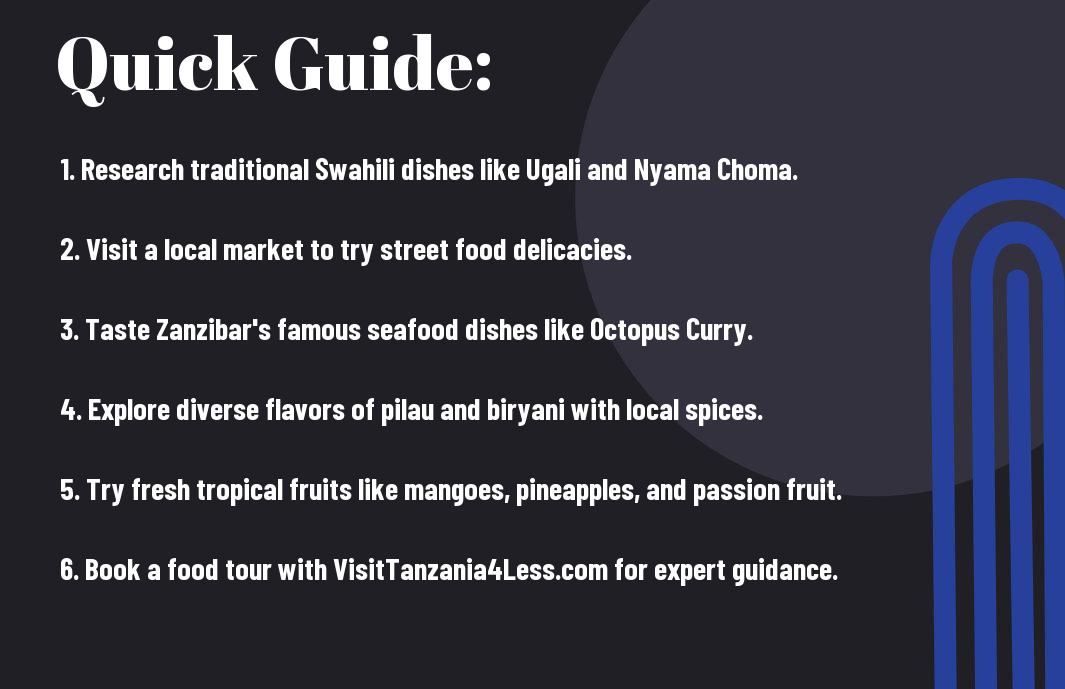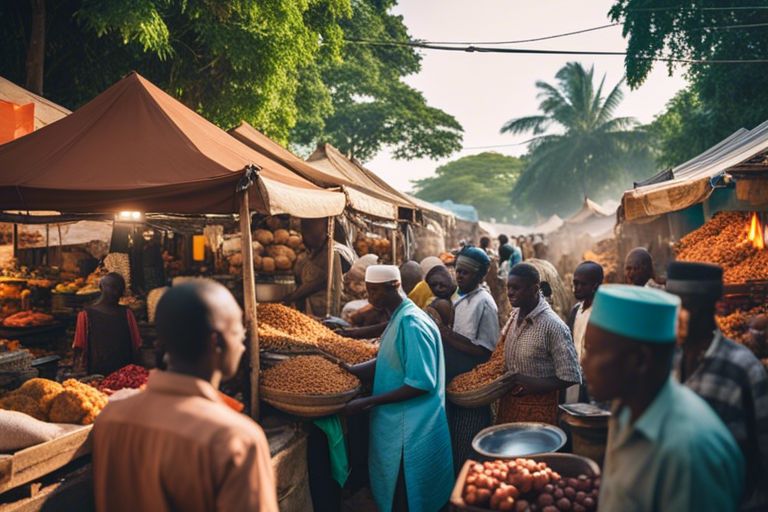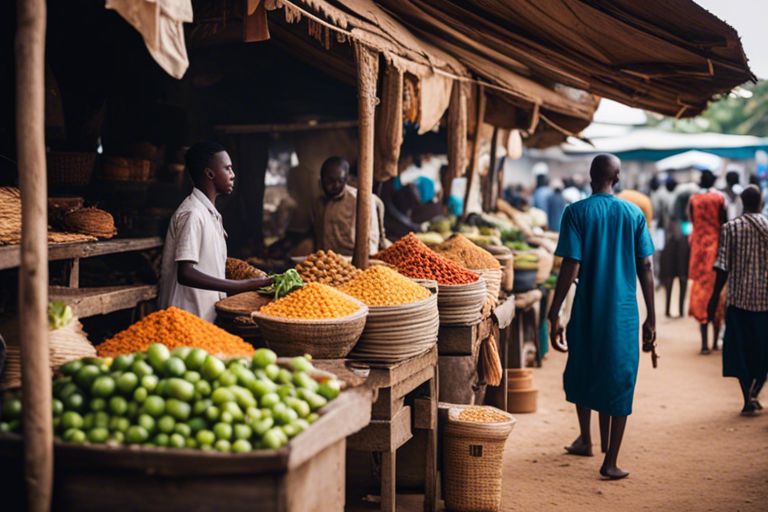The Best Local Cuisine To Try In Tanzania & Zanzibar With VisitTanzania4Less.com
If you are planning a trip to Tanzania and Zanzibar, trying the local cuisine is a must-do experience. From the bustling markets to the serene beaches, these destinations offer a rich tapestry of flavors that will tantalize your taste buds. In this guide, we will introduce you to some of the best local dishes to try in Tanzania and Zanzibar, curated by VisitTanzania4Less.com. Get ready to begin on a culinary journey that will leave you craving for more!
Key Takeaways:
- Discover unique flavors: Tanzanian cuisine offers a mix of African, Indian, and Arab influences, creating a range of distinct and flavorful dishes.
- Must-try dishes: Don’t miss out on trying local favorites like Ugali (maize meal porridge), Nyama Choma (grilled meat), and Zanzibar’s renowned seafood dishes like Octopus Curry.
- Culinary adventure: Embark on a culinary journey through Tanzania and Zanzibar with VisitTanzania4Less.com to experience the rich diversity and delicious flavors of East African cuisine.

Types of Tanzanian and Zanzibari Dishes
Some of the most flavorful and unique dishes you can try in Tanzania and Zanzibar will take your taste buds on a culinary adventure. From rich stews to spicy seafood, the local cuisine reflects a mix of African, Arabic, and Indian influences. To truly experience the culture of this region, indulging in traditional Tanzanian and Zanzibari dishes is a must.
| Main Dishes | Street Foods and Snacks |
| Pilau rice | Mishkaki (grilled meat skewers) |
| Ugali (maize porridge) | Zanzibari pizza |
| Wali wa nazi (coconut rice) | Samosas |
| Nyama choma (grilled meat) | Kachumbari (fresh tomato and onion salad) |
| Pilipili hoho (spicy green peppers) | Mandazi (sweet fried dough) |
Main Dishes to Savor
One cannot visit Tanzania and Zanzibar without trying the iconic Pilau rice, a fragrant dish cooked with an assortment of spices. Another must-try is Nyama choma, grilled meat that is often enjoyed with ugali or wali wa nazi.
Street Foods and Snacks
Dishes such as Mishkaki, grilled meat skewers marinated in spices, and Zanzibari pizza, a delightful fusion of African and Arabic flavors, are popular street foods that offer a taste of local cuisine. Snacks like samosas and mandazi can be found in bustling markets and street corners, providing a quick and flavorful bite on the go.
Assume that indulging in Tanzanian and Zanzibari street foods and snacks will introduce you to a world of bold flavors and culinary delights that you won’t soon forget.
Tips for Enjoying Local Cuisine
Your visit to Tanzania and Zanzibar is not complete without indulging in the delicious local cuisine that the region has to offer. To make the most of your culinary experience, here are some tips to keep in mind:
- Be adventurous and try new dishes.
- Engage with locals to learn about traditional cooking methods and ingredients.
- Visit local markets to sample fresh fruits, spices, and other ingredients.
- Stay hydrated and opt for bottled water to avoid any potential foodborne illnesses.
- Respect cultural dining practices and traditions.
This will ensure that you have an authentic and unforgettable gastronomic experience during your travels in Tanzania and Zanzibar.
Cultural Etiquette and Dining Practices
For a truly immersive experience, familiarize yourself with the cultural etiquette and dining practices of Tanzania and Zanzibar. Remember to wash your hands before and after meals and eat with your right hand as per local custom. Additionally, it is polite to accept food or drinks when offered as a gesture of hospitality.
Navigating Dietary Restrictions and Allergies
For travelers with dietary restrictions or allergies, it is important to communicate your needs clearly when dining out in Tanzania and Zanzibar. Be cautious of dishes that may contain allergens, and inquire about ingredients used in the preparation. It is advisable to carry necessary medications or food alternatives in case of emergencies.
It is also recommended to stick to cooked foods and avoid consuming raw or undercooked dishes to minimize the risk of foodborne illnesses. By being proactive and mindful of your dietary requirements, you can enjoy the local cuisine without compromising your well-being.
A Step-by-Step Guide to Culinary Exploration
To fully experience the rich culinary heritage of Tanzania and Zanzibar, one must commence on a culinary exploration that engages all the senses. From savory stews and grilled meats to aromatic spices and tropical fruits, the local cuisine of these regions offers a diverse and flavorful experience. Follow this step-by-step guide to make the most of your culinary adventure.
Selecting the Best Eating Spots
If you want to savor the authentic flavors of Tanzania and Zanzibar, selecting the best eating spots is crucial. Look for bustling local markets, roadside food stalls, and family-run restaurants where you can enjoy traditional dishes made with fresh, locally sourced ingredients. Don’t be afraid to try street food, as some of the best culinary gems can be found in the most unexpected places.
Pairing Food with Local Beverages
Even a delicious meal can be elevated when pairing food with local beverages in Tanzania and Zanzibar. Traditional drinks like spiced tea, coconut water, and palm wine complement the bold flavors of local dishes perfectly. Be sure to also sample the region’s famous coffee, which is known for its strong aroma and rich taste.
Guide: When pairing food with local beverages in Tanzania and Zanzibar, it’s imperative to consider the balance of flavors between the dish and the drink. Additionally, be cautious of consuming tap water and ice cubes, as they may not be safe for tourists. Embrace the opportunity to try new flavors and combinations, but always prioritize your health and well-being.

Factors to Consider When Choosing Meals
Unlike other destinations, Tanzania and Zanzibar offer a wide range of culinary delights that can sometimes be overwhelming for visitors. When choosing meals, it’s important to consider a few key factors to ensure an authentic and enjoyable dining experience.
- Local Ingredients: Opt for dishes made with fresh, locally sourced ingredients to truly savor the flavors of the region.
- Cultural Significance: Try dishes that hold cultural significance and have been passed down through generations for a taste of tradition.
- Seasonality: Consider the seasonality of certain dishes to enjoy them at their freshest and most flavorful.
- Spice Level: Be mindful of the spice level in Tanzanian and Zanzibari cuisine, as it can vary from mild to very hot.
Regional Specialties
Some of the regional specialties to look out for include Ugali, a staple maize meal often served with savory sauces or stews, and Zanzibari Pilau, a fragrant rice dish flavored with a mix of spices and meats. These dishes offer a true taste of the local food culture.
Seasonality and Freshness
When considering the seasonality and freshness of dishes, it’s important to note that seafood is a prominent feature in coastal regions like Zanzibar, where freshly caught fish and shellfish are abundant. Seasonal fruits such as mangoes, pineapples, and passion fruits are also popular ingredients in many Tanzanian and Zanzibari dishes.
This ensures that you are not only enjoying the most flavorful dishes but also supporting local producers and sustainable food practices.
The Pros and Cons of Street Food Versus Restaurants
All information important for foodies!
| Street Food | Restaurants |
| Authenticity | Ambiance |
| Flavor Profiles | Cleanliness |
| Price | Consistency |
| Convenience | Service |
| Experience | Menu Options |
Authenticity and Flavor Profiles
Restaurants offer a controlled environment to ensure consistent flavors in their dishes. However, street food often provides a more authentic experience with bold and unique flavor profiles that truly represent the local cuisine.
Health and Safety Considerations
Pros of restaurants include stringent hygiene practices and regulated food handling processes that reduce the risk of foodborne illnesses. With street food, while it offers a glimpse into local culinary traditions, there can be higher chances of contamination due to unregulated food preparation and storage methods.
Final Words
Considering all points, it is clear that when visiting Tanzania and Zanzibar, exploring the local cuisine is a must-do activity for any traveler. With VisitTanzania4Less.com as your guide, you can enjoy a culinary adventure like no other, sampling traditional dishes such as ugali, nyama choma, and pilau, while experiencing the rich cultural tapestry that defines these regions. From the bustling food markets to the serene coastal restaurants, there is something for every taste bud to discover. So, don’t miss out on the opportunity to tantalize your taste buds and immerse yourself in the vibrant flavors of Tanzania and Zanzibar with VisitTanzania4Less.com.
FAQ
Q: What are some of the best local cuisines to try in Tanzania and Zanzibar?
A: When visiting Tanzania and Zanzibar, you must try the following local cuisines:
– Ugali: A staple dish made from maize flour.
– Nyama Choma: Grilled meat, often accompanied by local condiments.
– Pilau: Spiced rice often served with meat.
– Zanzibar Pizza: A popular street food with various fillings like meat, cheese, or vegetables.
– Mshikaki: Skewered and grilled meat, similar to kebabs.
Q: How can VisitTanzania4Less.com help in exploring the local cuisine of Tanzania and Zanzibar?
A: VisitTanzania4Less.com offers local food tours and culinary experiences that allow you to immerse yourself in the rich food culture of Tanzania and Zanzibar. They provide guided tours to local markets, street food stalls, and authentic restaurants, ensuring you get a taste of the best local cuisines the region has to offer.
Q: Is it safe to try street food in Tanzania and Zanzibar?
A: Yes, trying street food in Tanzania and Zanzibar is generally safe, as long as you choose vendors with good hygiene practices and opt for freshly prepared food. VisitTanzania4Less.com can recommend reputable street food vendors and guide you on the best dishes to try, ensuring you have a safe and enjoyable culinary experience.







